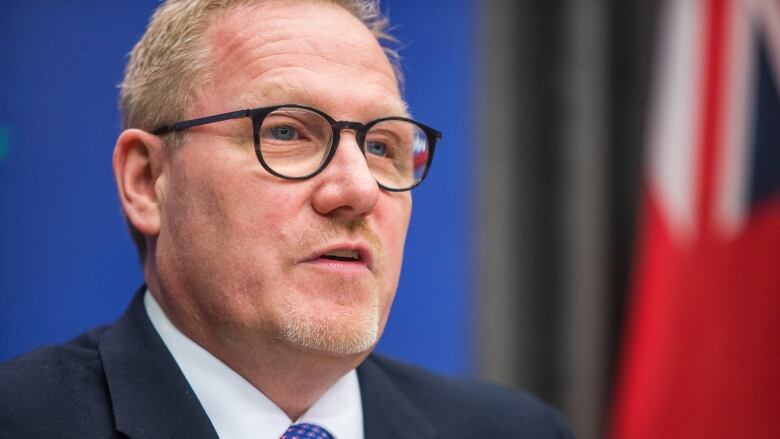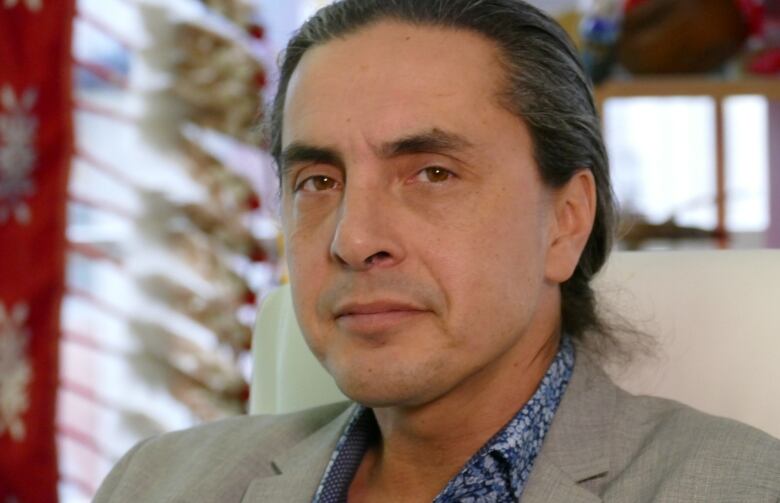Manitoba government wishes feds were sending more money for health care this year, says finance minister
Mixed reaction locally on funding for long-term care, Indigenous issues

The Manitoba government wishes Ottawa was sending more money for health care as part of the 2021 federal budget.
Canada Finance Minister Chrystia Freeland unveiled the federal government's 2021 budget Monday. Among its highlights is $43.1 billion for provincial and territorial health-care systems through the Canada Health Transfer this fiscal year.
Only $1.56 billion of that is going to Manitoba, however, according to the federal government's website.
"We're a little disappointed about the health transfers," said Manitoba Finance Minister Scott Fielding, adding that it was province's No. 1 priority with regards to the budget.
The COVID-19 pandemic has strained the Manitoba health-care system's ability to deliver other essential operations and services, such as some surgeries and diagnostic services, that are unrelated to COVID-19 treatment.
The federal funding would have been spent on reducing wait times for those services, Fielding said.
The Pallister government also would have liked to see a plan that addresses how the federal government plans to claw its way out of a major deficit, said Fielding.
Canada's deficit is about $354.2 billion after last fiscal year. That is expected to improve to $154.7 billion this fiscal year, then gradually decline to $30.7 billion in 2025-26, the budget says.
Stefan Dodds, associate professor of economics at the University of Winnipeg, notes that the deficit is so large it's hard to picture. But had the government not spent money on things like income support, the economy would be very different.
"We wouldn't be necessarily talking about a rebound and building back better," said Dodds. "We'd be talking about much higher unemployment, much higher suffering and misery."
The Manitoba government did like several budget items, namely the expansion of COVID-19 wage subsidies and the amount of time workers can receive sick leave, said Fielding.
The new budget proposes spending $3 billion over five years, starting this fiscal year, and nearly $967 million per year afterward to extend Employment Insurance sickness benefits from 15 weeks to 26 weeks.
The extension would start some time in the summer of 2022, the budget says.

Manitoba PCs support major child care investment
Another positive for the Pallister government was a major investment in child care which aims to make child care more accessible, while making it easier for women to participate full-time in the labour force.
"[Child care is] really a focal point for us, making sure working families specifically during the pandemic can get some additional dollars," said Fielding.
The 2021 federal budget committed $30 billion over five years, plus $8.3 billion ongoing, for early learning and child care.
Up to $27.2 billion will be spent over five years, starting this year, to increase the amount of money the federal government is spending on child care costs. The spending will make it a 50/50 split with provincial spending, the budget says.
Ottawa aims to halve average fees for regulated early learning and child care in all provinces except Quebec by the end of 2022. The federal government also wants all regulated child care spaces in Canada to cost $10 a day on average by 2025-26, the budget says.
The Manitoba government expects upwards of $180 million to come its way, but the exact details have to be ironed out with Ottawa, said Fielding.
Shiu-Yik Au, University of Manitoba assistant business professor, was surprised by the amount being spent on child care, given eligible families receive tax-free money to raise children under the age of 18 through the Canada child benefit.
"It seems like a lot of money for the same thing," said Au.
Feds commit $3B to long-term care standards
The COVID-19 pandemic exposed systemic problems in the standard of care people received in care homes across the country. Manitoba care homes were no exception.
The federal budget commits $3 billion over five years, starting in the 2022-23 fiscal year, to Health Canada to help provinces and territories ensure "standards for long-term care are applied and permanent changes are made."
"This work would ensure seniors and those in care live in safe and dignified conditions," the budget says.
The money is somewhat welcome news to Lawrence Lewcey, whose mother was among the 56 residents at Maples Long Term Care Home who died last November because of a COVID-19 outbreak.
"The federal government is giving money for long-term care homes, but we just don't know what that looks like," said Lewsey.
Lewsey wants to see a breakdown of how the $3 billion will be spent and how the federal government plans to oversee the spending.
The Canadian government is also proposing to increase the amount of money sent through old age security to pensioners 75 year old and up, starting in 2022.
In August 2021, the federal government plans to send a one-time taxable payment of $500 to pensioners who will be at least 75 years old as of June 2022. The feds would then propose to table legislation that increases regular old age security payments by 10 per cent as of July 2022, the budget says.
Lewsey, who is 65 years old, believes the $500 isn't much for seniors and that more should go to all seniors.
"I understand they want to help seniors when their incomes are a lot worse at an elderly age," he said. "But a lot of seniors need help. Younger seniors need help now."

$15 minimum wage 'nice to see'
The federal government intends to establish a $15 federal minimum wage, in part because the COVID-19 pandemic showed that most essential workers were minimum-wage earners, the budget says.
The feds plan to introduce legislation that will establish a minimum wage of $15 per hour, rising with inflation. The bill would include provisions that ensure that, if a province or territory has a higher minimum wage, that's what the worker would receive, the budget says.
"It's nice to see that they're seeing that that had to be established moving forward to be able to recover from COVID," said Millie Acuna, manager of SEED Winnipeg's asset building programs, which help low-income residents to save for "productive assets" or household necessities.
"It is ultimately going to help people budget for the hardest hit times right now, and having that set it's a relief actually."
SEED Winnipeg is seeing many people going into debt or using fringe financial services to stay afloat, which is causing fear with regards to filing taxes. There is also food and housing insecurity and confusion about where to turn for help, said Acuna.
Seeing a higher minimum wage on the horizon makes things somewhat less scary, and will reduce stress on a lot of people.
The budget does not specify when the federal government intends to table the $15 minimum wage.
Over $18B over 5 years for Indigenous communities
One of Manitoba's grand chiefs is glad to hear of the amount of money going toward Indigenous people and their communities but he's taking it with a grain of salt.
The federal budget plans to spend over $18 billion over five years to "improve the quality of life and create new opportunities" for people living in Indigenous communities across Canada.
Some of the planned initiatives include addressing socio-economic challenges in health care on reserves, building clean water infrastructure on reserves and taking "meaningful action" to end the tragedy of missing and murdered Indigenous women and girls.
"I'm always pleased when we get resources directed to First Nations. Although my apprehension is that we need to learn, progress and move forward," said Arlen Dumas, grand chief of the Assembly of Manitoba Chiefs.

Although Dumas does not believe $18 billion is truly enough to address the issues Indigenous people are facing, his bigger concern is an unfortunate pattern of the federal government announcing such spending only to remain at the status quo.
"We need to have more direct involvement in First Nations and our federal government, so that we can actually achieve greater successes and greater deliverables," he said.
Dumas pointed to how First Nations leadership have worked with federal officials throughout the pandemic, and the successes they have had in the fight against COVID-19, as an example of what could come with more direct collaboration.
With files from Peggy Lam, Faith Fundal and Ian Froese












_(720p).jpg)


 OFFICIAL HD MUSIC VIDEO.jpg)
.jpg)



























































































